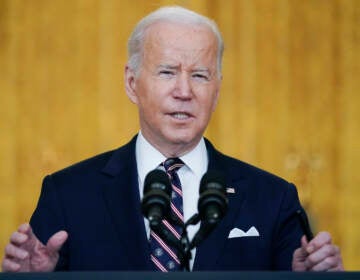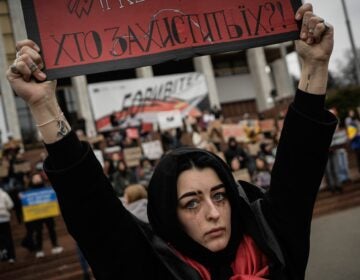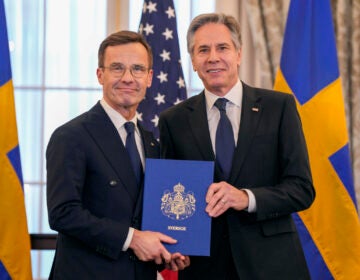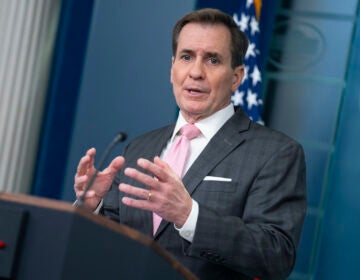Russia evacuates embassy in Ukraine as crisis escalates
Hopes for a diplomatic way out of a new, potentially devastating war in Europe appeared all but sunk as the U.S. and key European allies accused Moscow of crossing a red line.
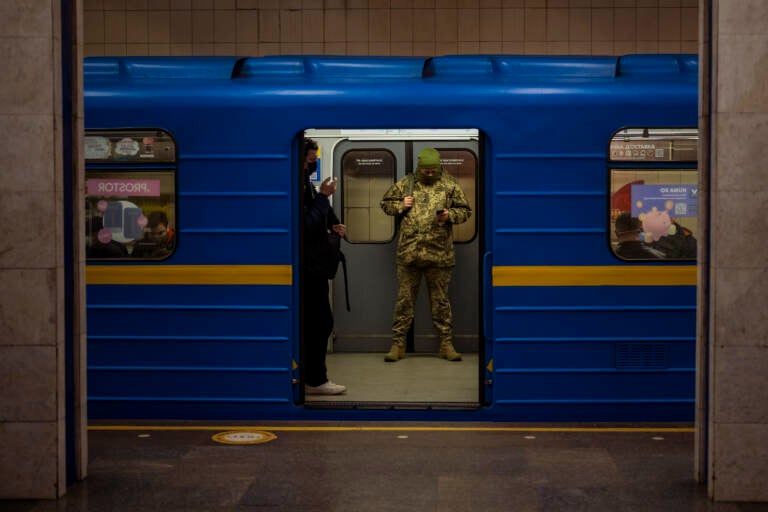
A Ukrainian army officer looks at his phone in a local train in Kyiv, Ukraine, Wednesday, Feb. 23, 2022. (AP Photo/Emilio Morenatti)
Russia began evacuating its embassy in Kyiv and Ukraine urged its citizens to leave Russia on Wednesday as the region braced for further confrontation after President Vladimir Putin received authorization to use military force outside his country and the West responded with sanctions.
Hopes for a diplomatic way out of a new, potentially devastating war in Europe appeared all but sunk as the U.S. and key European allies accused Moscow of crossing a red line Tuesday in rolling over Ukraine’s border into separatist regions in Ukraine’s east called Donbas, with some calling it an invasion.
Russia emptied its diplomatic posts in Ukraine, state news agency Tass reported, a day after the Foreign Ministry announced a plan to evacuate, citing threats. By Wednesday afternoon, the Russian flag no longer flew over the Kyiv embassy, and police surrounded the building.
After weeks of trying to project calm, Ukrainian authorities signaled increasing concern. The Foreign Ministry advised against travel to Russia and recommended any Ukrainians there leave immediately, saying Moscow’s “aggression” could lead to a significant reduction in consular services.
Ukraine’s National Security and Defense Council chief Oleksiy Danilov called for a national state of emergency, subject to parliamentary approval. He said it will be up to regional authorities to determine which measures to apply, but they could include increased security at public facilities, traffic restrictions and additional transport and document checks.
A senior U.S. defense official in Washington said the Russian forces arrayed along Ukraine’s borders are “as ready as they can be” for an invasion, with about 80% in what the U.S. considers “forward positions, ready to go” within 5 kilometers to 50 kilometers (3 to 30 miles) of the border.
The official, who spoke on condition of anonymity to discuss sensitive information, added. “We still cannot confirm that Russian forces have moved into the Donbas area.”
The White House was expected to announce Wednesday that President Joe Biden is allowing sanctions to move forward against the company that built the Russia-to-Germany Nord Stream 2 gas pipeline and against the company’s CEO.
The formal announcement was expected late in the day, according to a U.S. official who was not authorized to publicly discuss the matter before the decision was made public and who spoke on condition of anonymity.
Germany said Tuesday that it was indefinitely suspending the project, after Biden charged that Putin had launched “the beginning of a Russian invasion of Ukraine” by sending troops into two separatist regions of eastern Ukraine.
The pipeline is complete but has not yet begun operating.
Biden waived sanctions last year against the pipeline’s builder and operator, Nord Stream 2 AG, when the project was almost completed, in return for an agreement from Germany to take action against Russia if it used gas as a weapon or attacked Ukraine.
Putin said Tuesday that he hadn’t yet sent any Russian troops into the rebel regions contrary to Western claims, and Donetsk rebel leader Denis Pushilin insisted Wednesday there were no Russian troops in the region even though a local council member claimed the previous day they had moved in.
Ukraine’s Minister for Digital Transformation Mykhailo Fedorov said a wave of denial-of-service attacks targeted official websites and some banks Wednesday, knocking sites of the parliament, cabinet and Foreign Ministry offline and causing interruptions or delays to the sites of the defense and interior ministry, which controls the police.
Many of the same sites were similarly knocked offline in attacks last week that the U.S. and U.K. governments quickly blamed on Russia’s GRU military intelligence agency. Such attacks barrage websites with junk traffic, rendering them unreachable. Wednesday’s DDoS attacks appeared to have less impact than the earlier onslaught, with targeted sites soon reachable again — as emergency responders blunted them.
These were just the latest in a series of signs of escalating tensions. Kyiv recalled its ambassador to Russia and considered breaking all diplomatic ties with Moscow; dozens of nations further squeezed Russian oligarchs and banks out of international markets; Germany halted a lucrative pipeline deal; the U.S. repositioned additional troops to NATO’s eastern flank bordering Russia; and the top U.S. diplomat canceled a meeting with his Russian counterpart.
Already, the threat of war has shredded Ukraine’s economy and raised the specter of massive casualties, energy shortages across Europe and global economic chaos.
Even as the conflict took a new, dangerous turn, leaders warned it could still get worse. Putin has yet to unleash the force of the 150,000 troops massed on three sides of Ukraine, while U.S. President Joe Biden held back on even tougher sanctions that could cause economic turmoil for Russia but said they would go ahead if there is further aggression.
European Union sanctions against Russia took effect, targeting several companies along with 351 Russian lawmakers, who voted for a motion urging Putin to recognize the rebel regions, and 27 senior government officials, business executives and top military officers.
German Foreign Minister Annalena Baerbock called the EU sanctions only “a first step” and said more could follow. Sanctions are key because the West has ruled out taking on Russia militarily.
Ukrainian Foreign Minister Dmytro Kuleba urged Western leaders not to wait.
“We call on partners to impose more sanctions on Russia now,” he tweeted Wednesday. “Now the pressure needs to step up to stop Putin. Hit his economy and cronies. Hit more. Hit hard. Hit now.”
Responding defiantly to the steps already taken, Russian Ambassador to the U.S. Anatoly Antonov retorted on Facebook that “sanctions cannot solve a thing. It is hard to imagine that there is a person in Washington who expects Russia to revise its foreign policy under a threat of restrictions.”
Russia’s Foreign Ministry has also bristled at sanctions. “Russia has proven that, with all the costs of the sanctions, it is able to minimize the damage,” a statement read.
In Ukraine’s east, where an eight-year conflict between Russia-backed separatists and Ukrainian forces has killed nearly 14,000 people, violence also spiked again. One Ukrainian soldier was killed and six more were injured after rebel shelling, the Ukrainian military said. Separatist officials reported several explosions on their territory overnight and three civilian deaths.
In St. Petersburg, meanwhile, several hundred people reportedly rallied in support of the self-proclaimed Donetsk and Luhansk republics in the east, while Russia marked Defender of the Fatherland Day, which celebrates the country’s veterans and active servicemen.
After weeks of rising tensions, Putin took a series of steps this week that dramatically raised the stakes. First, he recognized the independence of those separatist regions. Then, he said that recognition extends even to the large parts of the territories now held by Ukrainian forces, including the major Azov Sea port of Mariupol.
Finally, lawmakers gave him authority to use military force outside the country — effectively formalizing a Russian military deployment to the rebel regions.
Putin laid out three conditions that he said could end the standoff, urging Kyiv to recognize Russia’s sovereignty over Crimea, the Black Sea peninsula that Moscow annexed from Ukraine in 2014, to renounce its bid to join NATO and partially demilitarize. Ukraine long has rejected such demands.
As rhetoric in Russia and the West toughened, British Defense Secretary Ben Wallace recalled how the British army “kicked the backside” of Russia during the Crimean War in the 19th century. Russia’s Defense Minister Igor Konashenkov fired back, dismissing Wallace’s claims as “mythology” and advising British soldiers to study the history of Russia to avoid “enriching our shared military history with their lives for the pleasure of poorly educated British politicians.”
___
Litvinova reported from Moscow. Angela Charlton in Paris; Frank Jordans in Berlin; Lorne Cook in Brussels, Vladimir Isachenkov in Moscow, Frank Bajak in Boston, Robert Burns, Matthew Lee, Aamer Madhani, Eric Tucker, Ellen Knickmeyer, Zeke Miller, Chris Megerian and Darlene Superville in Washington contributed.
WHYY is your source for fact-based, in-depth journalism and information. As a nonprofit organization, we rely on financial support from readers like you. Please give today.



